Mala istorijska biblioteka

- Posts : 10317
Join date : 2012-02-10
- Post n°226
 Re: Mala istorijska biblioteka
Re: Mala istorijska biblioteka
Problems of Communism (1954-1992)

- Guest
- Post n°227
 Re: Mala istorijska biblioteka
Re: Mala istorijska biblioteka
U nedostatku boljeg topika:
Protivljenje dijela povjesničara upućivanju kurikuluma povijesti na međunarodnu recenziju
15. veljače 2018. Leave a comment
Za “Hrvatski tjednik” izjave o tome dali su Mato Artuković, Ivo Banac, Ante Birin, Ante Bralić, Neven Budak, Mario Jareb, Zrinka Pešorda Vardić, Petar Marija Radelj i Robert Skenderović, a urednička oprema priloga navodi da “Većina hrvatskih povjesničara gleda s čuđenjem na odluku da se kurikul povijesti uputi na recenziju u inozemstvo”, iako mnogi hrvatski povjesničari koji nisu zastupljeni u prilogu – suprotno tome – ne gledaju s čuđenjem na tu odluku.
Većina hrvatskih povjesničara gleda s čuđenjem na odluku da se kurikul povijesti uputi na recenziju u inozemstvo
Hrvatski povjesničari javno pitaju ministricu Divjak:
Zašto ste strancima dali da nam pišu povijest?
Mato Artuković
Slanje kurikula povijesti strancima na recenziju velika je uvreda i sramota – to ni jedan narod u Europi u povijesti nije napravio, ne radi, niti će ikada uraditi
Ivo Banac
Ne mogu hrvatsku povijest pisati oni koji ne poznaju izvore, ali, na žalost, imamo i redovite profesore koji pišu bez uvida u arhivska vrela
Ante Birin
Iskreno, bojim se da će politika odlučiti da nam poviejst pišu stranci, i to odabrani “stručnjaci”
Ante Bralić
Nedopustivo je eksperimentirati na našoj djeci
Neven Budak
Ništa sporno da se recenzije pišu u inozemstvu, ništa sporno ni u nazivu kurikulum
Mario Jareb
Slanje uputnika povijesti na recenziju u inozemstvo je neopravdan, neodgovoran i sluganski potez
Zrinka Pešorda Vardić
Po sporazumu o pridruživanju Hrvatske EU, obrazovanje je u nadležnosti nacionalne države
Petar Marija Radelj
To je čin nepovjerenja i otklona od domaćih stručnjaka
Robert Skenderović
Vlada bi ovo morala stopirati: ne zna se tko su strani recenzenti kurikula povijesti u kojemu se učenicima ne prenosi nikakvo znanje, ali se od njih traži zaključivanje!
http://www.historiografija.hr/?p=8394

- Posts : 10317
Join date : 2012-02-10
- Post n°228
 Re: Mala istorijska biblioteka
Re: Mala istorijska biblioteka
Naleteo sam u nekom zabačenom ćošku harddiska pa sam se setio da smo diskutovali o ovome
Nicholas Velimirovic, The Soul of Serbia (London, 1916)
Nicholas Velimirovic, The Soul of Serbia (London, 1916)

- Posts : 22555
Join date : 2014-12-01
- Post n°229
 Re: Mala istorijska biblioteka
Re: Mala istorijska biblioteka
Uvek na strani demokratije i slobode.
Hunting Che: PART 1 of 2: How a U.S. Special Forces Team Helped Capture the World's Most Famous Revolutionary by Mitch Weiss and Kevin Maurer
Hunting Che: PART 2 of 2: How a U.S. Special Forces Team Helped Capture the World's Most Famous Revolutionary by Mitch Weiss and Kevin Maurer
Hunting Che: PART 1 of 2: How a U.S. Special Forces Team Helped Capture the World's Most Famous Revolutionary by Mitch Weiss and Kevin Maurer
Hunting Che: PART 2 of 2: How a U.S. Special Forces Team Helped Capture the World's Most Famous Revolutionary by Mitch Weiss and Kevin Maurer
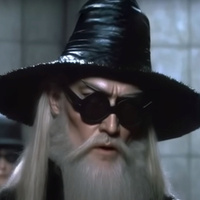
- Posts : 8696
Join date : 2016-10-04
- Post n°230
 Re: Mala istorijska biblioteka
Re: Mala istorijska biblioteka
Ко ће ово све да слуша...
Код нас је још давно писано да су га пратили авио-извиђањем.
Чеова група се кретала кроз џунглу, али су спремали храну редовно, на некој пећи који мало дими. На основу топлотног трага дима су могли да их прате кроз џунглу, и да им редовно препрече пут где треба.
Код нас је још давно писано да су га пратили авио-извиђањем.
Чеова група се кретала кроз џунглу, али су спремали храну редовно, на некој пећи који мало дими. На основу топлотног трага дима су могли да их прате кроз џунглу, и да им редовно препрече пут где треба.

- Posts : 22555
Join date : 2014-12-01
- Post n°231
 Re: Mala istorijska biblioteka
Re: Mala istorijska biblioteka
Ne samo to, u celoj operaciji su ucestvovali i hrabri specijalci, zastitnici potlacenih i obespravljenih.

- Guest
- Post n°232
 Re: Mala istorijska biblioteka
Re: Mala istorijska biblioteka
http://sluzbenenovine.rs/
Digitalizovane službene novine od 1813. do 1944.
Digitalizovane službene novine od 1813. do 1944.

- Posts : 10317
Join date : 2012-02-10
- Post n°233
 Re: Mala istorijska biblioteka
Re: Mala istorijska biblioteka
ima li se gde skinuti knjiga?
Occupied Economies: An Economic History of Nazi-Occupied Europe, 1939-1945
Occupied Economies: An Economic History of Nazi-Occupied Europe, 1939-1945

- Guest
- Post n°236
 Re: Mala istorijska biblioteka
Re: Mala istorijska biblioteka
Mission Impossible
Two new books offer contrasting pictures of American ambassadors to Russia
SEAN GUILLORY
ROADS NOT TAKEN: AN INTELLECTUAL BIOGRAPHY OF WILLIAM C. BULLITT
BY ALEXANDER ETKIND PITTSBURGH: UNIVERSITY OF PITTSBURGH PRESS. 264 PAGES. $25.
FROM COLD WAR TO HOT PEACE: AN AMERICAN AMBASSADOR IN PUTIN’S RUSSIA
BY MICHAEL MCFAUL NEW YORK: HOUGHTON MIFFLIN HARCOURT. 528 PAGES. $30
As relations between Russia and the United States continue to worsen, one of the unexpected twists in the unfolding drama has been the dragging of each nation’s ambassadors into the limelight. Usually, these diplomatic figures spend most of their time hosting parties and attending state ceremonies. But the compulsion to conjure phantoms has made two recent ambassadors—Michael McFaul, Obama’s ambassador to Russia from 2012 to 2014, and Sergey Kislyak, Putin’s ambassador to the US from 2008 to 2017—into the public faces of their countries’ treachery.
Bizarre as the current situation is, the role now being played by ambassadors is not entirely novel. Diplomats have often been cast in leading parts in international political dramas. (“An ambassador resembles in some way an actor exposed on the stage to the eyes of the public in order to play great roles,” the French diplomat François de Callières wrote in 1716.) But how much power to shape events does an ambassador really have? In light of the conspiracy theories that have proliferated during the current standoff between the US and Russia, two recent books couldn’t have come at a more opportune time. The first, McFaul’s memoir, From Cold War to Hot Peace, recounts his experiences as Obama’s main Russia hand and then ambassador during Putin’s revanchist third term. The second, Alexander Etkind’s biography Roads Not Taken, traces the life of William C. Bullitt, the first American ambassador to the Soviet Union. Taken together, the books provide a valuable picture of the aspirations — and the limitations—of diplomatic engagement during critical moments in US-Russian relations over the past century.
McFaul’s dealings with Russia predate his appointment as ambassador by several decades. Research trips to the Soviet Union when he was a student in the 1980s left him with an enduring fascination with the country and convinced him that Russia deserved serious and forceful American engagement. But simply negotiating with Russia as a trading partner wasn’t enough. When it comes to foreign policy, McFaul is an unabashed idealist. For him, the United States is not only an indispensable nation for maintaining geopolitical balance, it has a global obligation rooted in its messianic “universal values” of democracy. As he makes clear in his memoir, he believes the United States has a moral duty to promote Russia’s democratic development, or, from another perspective, to “meddle” in its internal politics. An academic by training, McFaul has made a career spreading the good word of liberal democracy. He is the author of many scholarly publications on what is sometimes derisively known as “transitionology”—the investigation of how countries transition from communist systems to liberal democracies — and arguments for American-supported “democracy promotion” shepherding thosetransitions. McFaul’s intellectual, diplomatic, and personal interactions with the country are guided by a liberal-democratic time line that often seems less political than it does eschatological. By his second trip to the country, in 1985, he had already concluded that “only democratic change inside the Soviet Union [and later Russia] would allow our two governments and our two societies to come closer together.” In other words, Russia’s relations with America would be determined by the former’s willingness to convert.
From Cold War to Hot Peace is about the trials of democratic evangelism in a political culture as obstinate as Russia’s. McFaul is charmingly open about his and the American government’s activities to financially support Russian NGOs, sponsor seminars in election campaign training, and preach democratic ethics—activities that Putin would later point to as interference in Russia’s domestic politics. Detailing his efforts to aid Russian democrats in the late 1980s and 1990s, he affectionately refers to them as “my friends,” “my guys,” and “our side.” He declares his involvement with the National Democratic Institute, a Democratic Party–affiliated nonprofit that promoted democracy overseas with US government funds, “the most exhilarating and meaningful work of my professional career.” Yet he writes that his activism “would haunt [him] for decades” once he realized he “was no longer an observer of Russia’s revolution, but a participant.” At moments, McFaul tries to preempt imagined critics. “We were not ‘meddling’ in Russia’s internal affairs,” he writes of his time with NDI, “but invited guests of the Russian government.” He and his fellow Americans were “helping,” “educators,” “librarians”: in a word, missionaries.
An idealist by temperament as well as in intellect, McFaul exhibits a lack of cynicism that comes off as both admirable and naive. Of the 1993 Russian parliamentary elections he writes, “I always get excited on election days in democracies, no matter where they take place. There is something magical about citizens choosing their own leaders.” Could anyone really believe that these elections, held a mere two months after Yeltsin battered the Russian parliament with tank fire, were magical?
McFaul’s optimism was rewarded when he was appointed Obama’s advisor on Russian policy in 2008. During Obama’s first term, he was the key architect of the administration’s Russia “reset.” The reset’s goals were modest but look ambitious in hindsight: to critically engage Russia and establish a working relationship based on common interests while pursuing American foreign policy objectives and maintaining “our values.” It’s now fashionable to malign the reset as unrealistic, but, in many ways, it was a comprehensive and forward-looking program. Moreover, the reset produced some tangible results: a better rapport, albeit a brief one, between Washington and Moscow, a new START Treaty, and the Iran nuclear deal. These are hardly minor achievements. Given the climate between the US and Russia today, we are unlikely to see anything approaching the reset’s tone and successes for years. The reset also benefitted McFaul professionally. Obama promoted him from adviser to ambassador in 2011. McFaul’s time as ambassador to Russia was not easy. His years of democracy promotion came back to bedevil him almost immediately. It didn’t help that he arrived during mass protests against electoral fraud in Russia’s parliamentary elections in December 2011. He then unwisely hosted a group of Russian oppositionists at Spaso House, the American ambassadorial residence in Moscow, mere days after his arrival. Combined with the fact that the Obama administration had recently increased its democracypromotion budget in Russia by $3.5 million, and spent $9 million on “election-related activity” in 2011 alone, the incident gave Putin and his supine media ample ammunition to attack the United States for interfering in Russia’s electoral process.
In some ways, McFaul’s fate was sealed from the beginning. No matter what he did as ambassador, he could not escape being cast as an agent of regime change. Even before he landed in Russia, he had been billed as a villain in Putin’s 2012 reelection campaign. Doubling down on the conservatism and anti-Americanism of the silent Russian majority, Putin painted Russia as a nation under siege by internal and external enemies and himself as the sole defender of Russian sovereignty. Throughout his time in Moscow, McFaul was constantly harassed by Russian-state-television reporters and Putin-worshipping youth groups, pilloried on talk shows, slandered as a pedophile, made the target of death threats, and shadowed everywhere he went by the Russian secret services. Even his sons and wife were tailed. By 2014, only two years after he arrived in Moscow, McFaul was back at Stanford University.
Given his treatment at the hands of his Russian hosts, it’s surprising that McFaul remains relentlessly positive about “Russia’s long-term trajectory and our future with Russia.” Though he admits his “Montana optimism” might cloud his judgment, he’s convinced that “one day” Russia will be democratic and allied with the United States—even if McFaul is unsure when that day will arrive.
Roads Not Taken presents a very different picture of diplomatic life. Born in 1891 from aristocratic Philadelphian stock, William Christian Bullitt was a journalist, novelist, and unlikely diplomat. If McFaul resembles a missionary, Bullitt was a bon vivant who saw himself as a hard-bitten realist. Though both men argued for engagement with Russia, Bullitt was uninterested in spreading democracy. His conviction stemmed from a belief that the US was the only power capable of containing the spread of communism.
Virtually forgotten today, Bullitt was perhaps the most important fi gure in American foreign policy toward Russia in the twentieth century. This accolade is usually given to George F. Kennan, but as Etkind convincingly argues, there would be no Kennan without Bullitt. Bullitt was Kennan’s patron and mentor, and his positions on Russia in 1919 presage Kennan’s “containment policy” while predating it by two decades. An early champion of the United States as the indispensable nation in the wake of World War I and the Bolshevik Revolution, Bullitt worked as a journalist for much of the war until 1918, when he was a delegate to the Paris Peace Conference
and pushed Woodrow Wilson to engage Soviet Russia as a way to contain the influence of Bolshevism.
One particularly intriguing episode in Etkind’s biography involves the now forgotten deal Bullitt almost brokered with Lenin to end the Russian Civil War. In early 1919, the State Department dispatched him to Moscow under the cover of a “fact-finding mission” to negotiate peace. With his forces on the verge of defeat, Lenin, ever the pragmatist, proposed a deal that would have left the Bolsheviks with a state no bigger than that of Muscovy in the sixteenth century in exchange for Allied recognition of the Soviet government. Lenin gave the Allies a month’s deadline to accept. Recognizing the extraordinary opportunity, Bullitt lobbied Wilson hard to get the other powers to sign on. But a combination of illness and lack of political will had weakened Wilson as a peace broker, and ultimately the offer
expired. By the end of the year, the Bolsheviks’ fortunes had rebounded and Lenin was no longer giving the capitalists any deals. A potential road not taken.
This account is just one of several what-ifs in Etkind’s narrative. He takes this particular counterfactual too far, suggesting a deal with Lenin in 1919 could have prevented Stalin, Hitler, World War II, and the Holocaust. But revisiting such missed opportunities can provide lessons in how not to overlook similar ones in the future, even when those opportunities seem less than ideal. It is also a reminder that diplomacy requires politicians and diplomats willing to take risks and improvise.
Bullitt’s willingness to argue unpopular positions often paid off. An early advocate for restoring formal relations with Russia, he was appointed the fi rst American ambassador to the Soviet Union in 1933—a role he relished perhaps too much. As Etkind depicts it, Bullitt’s embassy was one big frat party. Dalliances with Russian women were so commonplace the US State Department complained to Bullitt that his staff “drank too much and were ‘pawing women.’” Rumors abounded about Bullitt’s own affairs. Russian ballerinas, particularly the Bolshoi’s Irina Charnotskaya and Stalin’s favorite, Olga Lepeshinskaya, were especially in demand. Bullitt and his deputies used to lock Charnotskaya in a vacant embassy room while she slept and “violently” fight over the key. Despite the security risks of giving so many Soviet citizens free rein in Spaso House, Charles Bohlen, one of Bullitt’s deputies, would recall that “I have never had more fun or interest in my whole life. . . . This embassy . . . is like no other embassy in the world.” A diplomatic Disneyland, as collectivization, famine, and terror engulfed millions of Soviet lives.
What Etkind calls the “theater of diplomacy” reached its macabre pinnacle with Bullitt’s ostentatious Spring Festival at Spaso House in April 1935. The ball came at a tense time in the Soviet Union. Only four months earlier, the Leningrad Party boss Sergei Kirov had been murdered, sending shock waves throughout the Stalinist leadership and society, precipitating the arrest and execution of thousands, and paving the way for the mass terror that reached its cannibalistic height in the winter of 1937 to 1938. Bullitt decided to organize the party anyway.
The Spring Festival was attended by everyone “who was anyone in Moscow, except Stalin.” Bullitt and his team had managed to rent roosters, baby goats, bears, and zebra fi nches to give the feel of a “collective farm.” Golden nets hung from the ceiling, flowers imported from Finland provided color, and duck-liver pâte from Strasbourg was served as a delicacy. The guests included high dignitaries of the Soviet government, including Karl Radek and Nikolai Bukharin, and luminaries of the Soviet arts, such as Vsevolod Meyerhold and Mikhail Bulgakov. “The future victims drank, danced, and fl irted together with their executioners, many of whom would later also perish,” Etkind grimly notes. The ball provided the inspiration for Satan’s Ball, in Bulgakov’s The Master and Margarita. Etkind suggests that Bullitt, who was close friends with Bulgakov, was himself the model for the devil Woland, the mysterious stranger who arrives in Moscow and turns it upside down.
Despite (or because of) his social activities, Bullitt became increasingly disillusioned with Stalin’s Russia. By the time he left Moscow, in 1936, Bullitt saw the Soviet Union as the greatest threat on earth to American interests. Engagement should continue, he maintained, but with extreme caution—Russia should be treated as a trading partner and as a dangerous rival. Etkind argues that he deserves credit for presciently urging the US to adopt a pose of caution toward the Soviet Union. But despite the fawning praise Bullitt heaped on FDR, the president continued to view Stalin as “Uncle Joe,” the friendly dictator and ally, throughout the war. Bullitt was sidelined and his views ignored until Kennan’s “Long Telegram,” which echoed Bullitt’s aggressive stance toward Russia, swayed the American foreign policy establishment to adopt containment in 1946. One person who recognized his debt to Bullitt was Kennan himself, who observed that Bullitt
unquestionably “deserved better of the country than he received of it.” The end of his life, he wrote, “was a sad, but not unnatural, ending for an unusually sanguine and unjustly frustrated man.”
For Bullitt, Russia was something to be aggressively contained. For McFaul, Russia was ripe for proselytization. Each approach deserves criticism as well as closer study: Together, they illustrate how Russia, in the American mind, is at once a potential source of contamination and a potential convert. Still, in spite of their limitations, both men earnestly tried to understand Russia and creatively engage it. Given the current climate of paranoia and distrust, we would all benefit from more earnest attempts at understanding. Perhaps then more mutually beneficial what-ifs could become what happened.

- Guest
- Post n°237
 Re: Mala istorijska biblioteka
Re: Mala istorijska biblioteka
Edward Madigan @MadiganEdward
Absolute must-read article for any student/scholar of the First World War. Horne and Kramer respond to fresh denials of German atrocities, attacks on their work, and sinister turn in German public history in@FAZ_Feuilleton Original & translation provided.
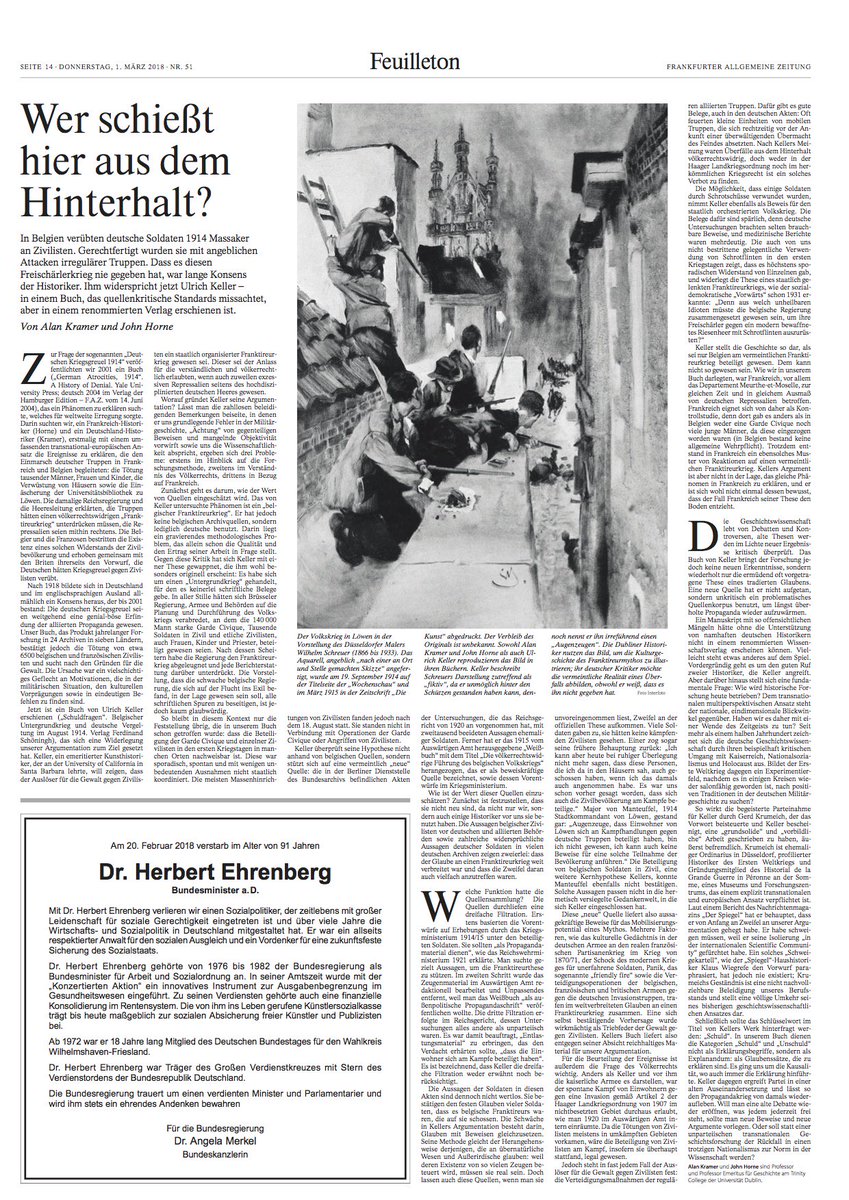
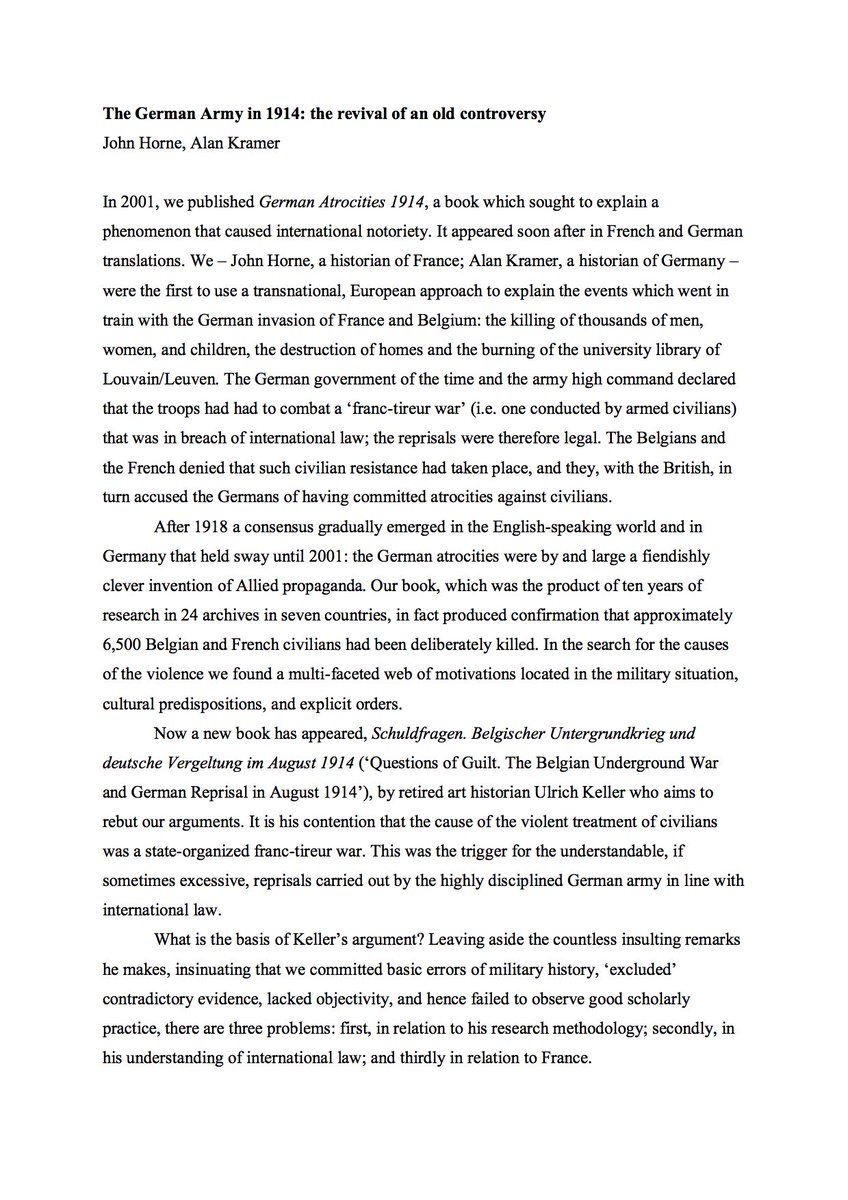
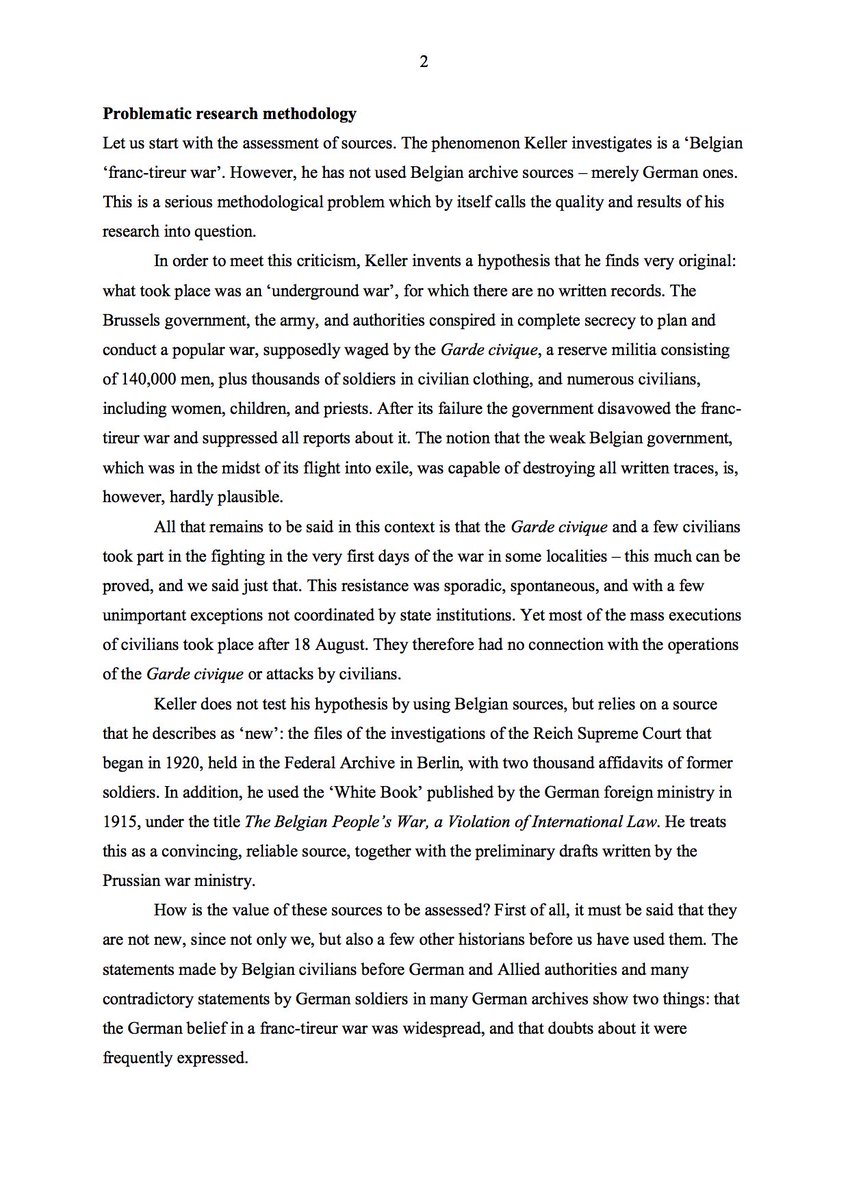
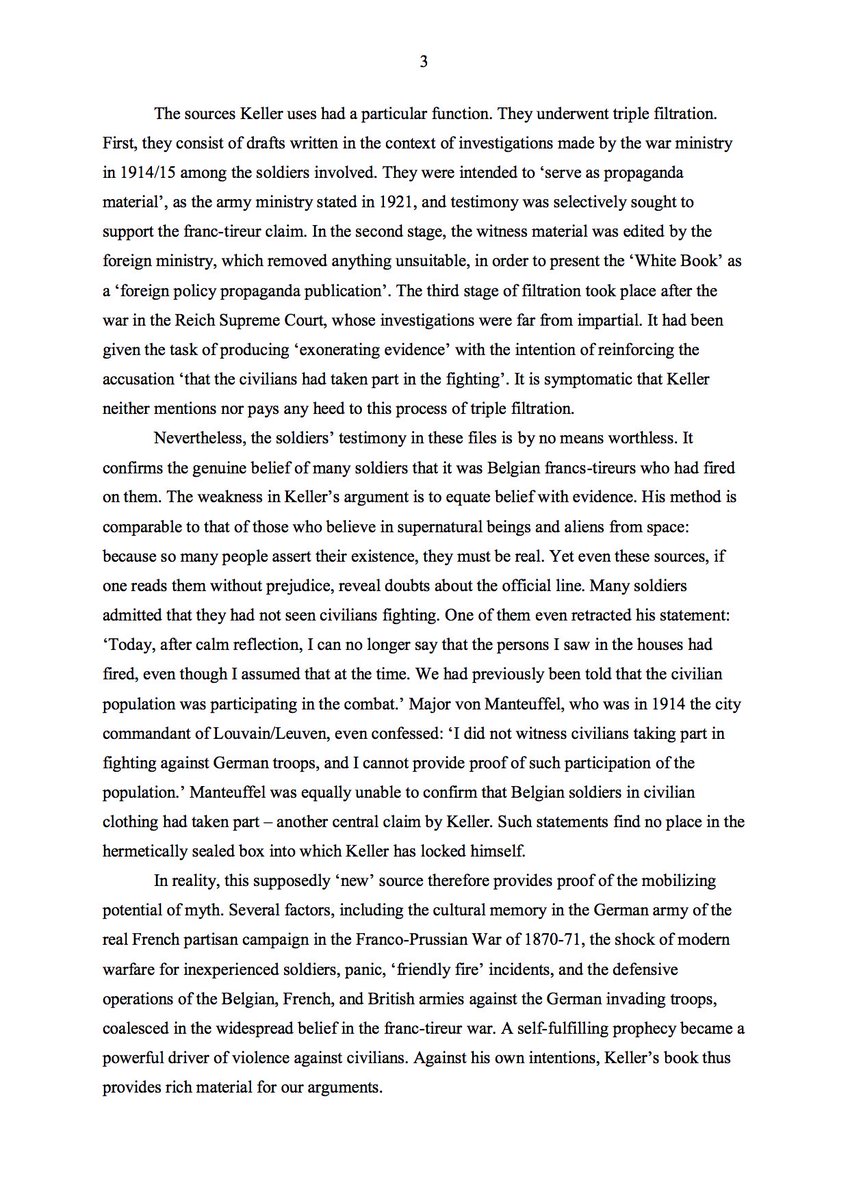
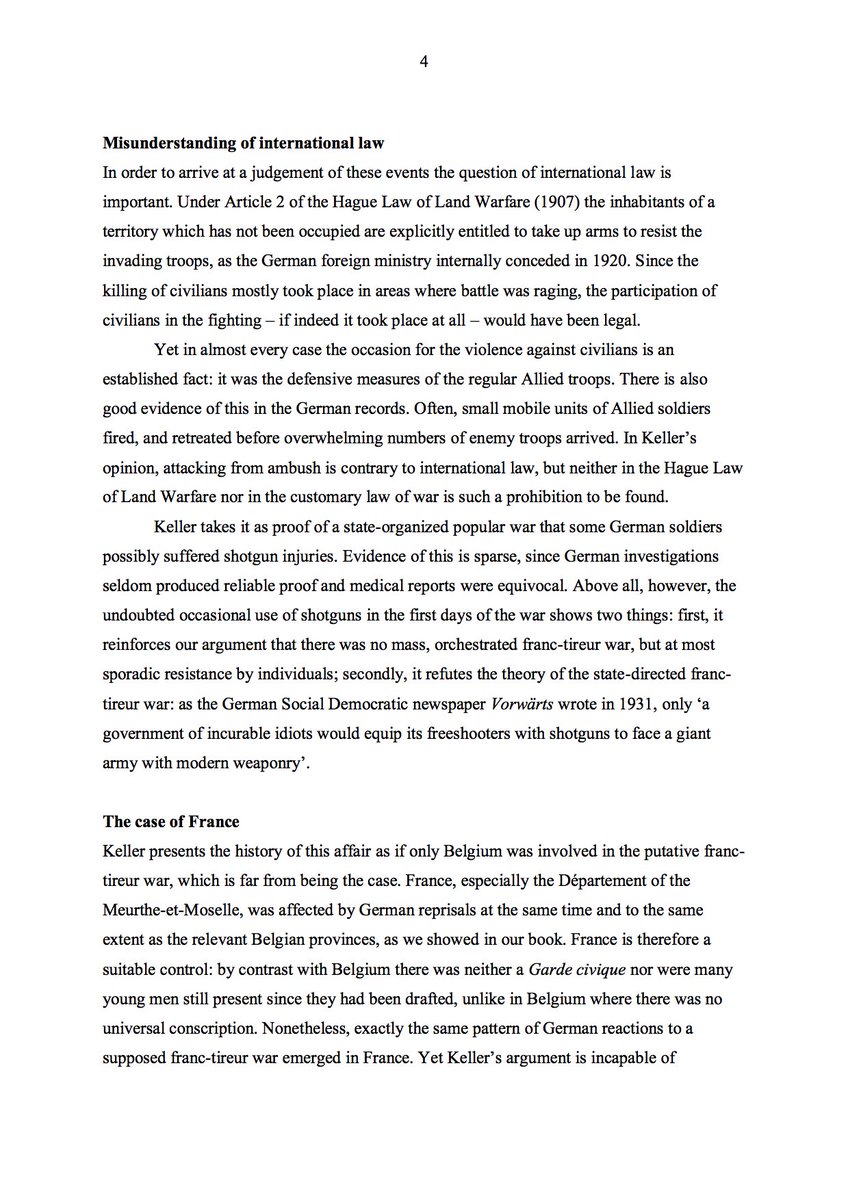
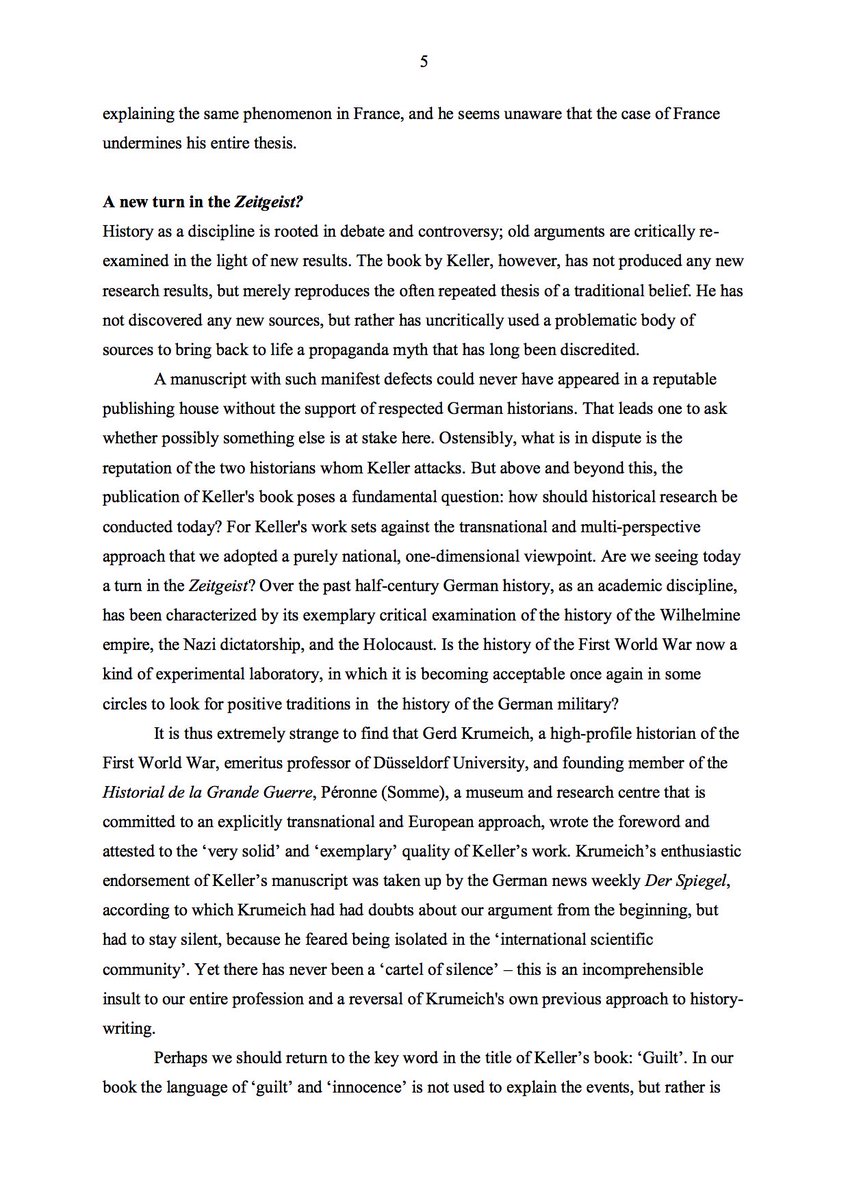
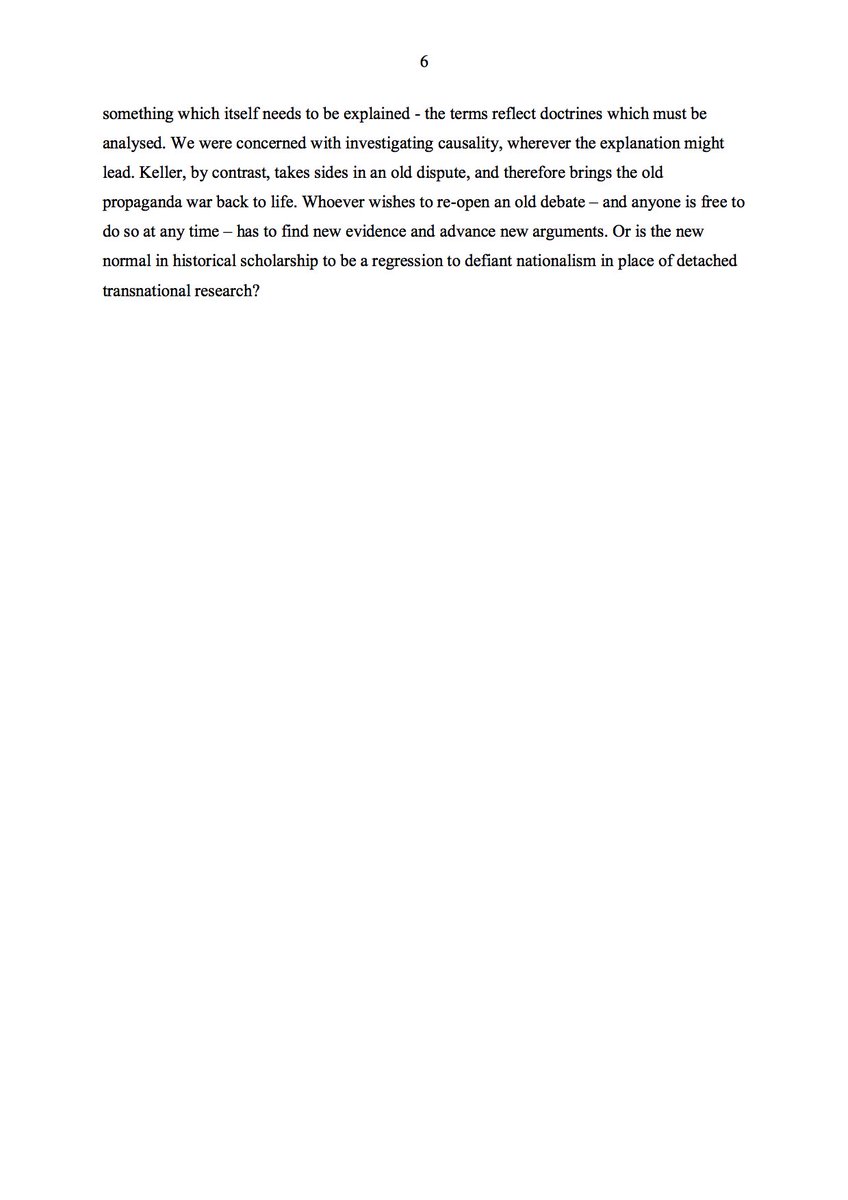
Absolute must-read article for any student/scholar of the First World War. Horne and Kramer respond to fresh denials of German atrocities, attacks on their work, and sinister turn in German public history in








- Posts : 10317
Join date : 2012-02-10
- Post n°238
 Re: Mala istorijska biblioteka
Re: Mala istorijska biblioteka
Prospero, imaš li negde odnos francuskog franka i rajhsmarke za 1941-1942?

- Guest
- Post n°239
 Re: Mala istorijska biblioteka
Re: Mala istorijska biblioteka
100 German reichsmark [1924-1948] in year 1941 could buy 36.210926338840395 gram gold. The price of 36.210926338840395 gram gold in year 1941 was 1872.2222222222192 French franc [1795-1960].
http://www.historicalstatistics.org/Currencyconverter.html
ranije sam koristio i činilo mi se pouzdanim
During the Nazi occupation of France (1940–44), the franc was a satellite currency of the German Reichsmark. The exchange rate was 20 francs for 1 RM.
više o markama
http://www.history.ucsb.edu/faculty/marcuse/projects/currency.htm
Mislim da možeš da ceniš na oko 20FF za 1RM, grubo rečeno.

- Posts : 10317
Join date : 2012-02-10
- Post n°240
 Re: Mala istorijska biblioteka
Re: Mala istorijska biblioteka
20 franaka za jednu marku? znači isto kao i dinar...
hvala, odlično
hvala, odlično

- Guest
- Post n°241
 Re: Mala istorijska biblioteka
Re: Mala istorijska biblioteka
dinar = franak?
ne znam napamet za međuratni period, dinar je praktično od full uvođenja u upotrebu tamo 1880ih bio paritetan sa frankom latinske unije.
ne znam napamet za međuratni period, dinar je praktično od full uvođenja u upotrebu tamo 1880ih bio paritetan sa frankom latinske unije.

- Posts : 10317
Join date : 2012-02-10
- Post n°242
 Re: Mala istorijska biblioteka
Re: Mala istorijska biblioteka
ma ne, nego je u Srbiji nemačkom uredbom propisan kurs od 20 dinara za jednu marku, mada bi mi bilo čudno da je važio ceo period okupacije jer je inflacija bila velika, moram to još da proverim. treba mi jer sam našao neku tabelu cena namirnica na crnom tržištu u Francuskoj, pa mi je interesantno da uporedim sa cenama u Srbiji

- Posts : 10317
Join date : 2012-02-10
- Post n°243
 Re: Mala istorijska biblioteka
Re: Mala istorijska biblioteka
ima li mozda negde da se skine?
Mark E. Warren, Democracy and Trust (1999)
Mark E. Warren, Democracy and Trust (1999)

- Posts : 10317
Join date : 2012-02-10
- Post n°244
 Re: Mala istorijska biblioteka
Re: Mala istorijska biblioteka
isto i ovo
Forsyth, Patrick B.; Adams, Curt M.; Hoy, Wayne K.
Collective Trust: Why Schools Can't Improve without It
Forsyth, Patrick B.; Adams, Curt M.; Hoy, Wayne K.
Collective Trust: Why Schools Can't Improve without It

- Guest
- Post n°245
 Re: Mala istorijska biblioteka
Re: Mala istorijska biblioteka
prvo ima - http://download1.libgen.io/get.php?md5=0C4853111D1A051E3FC011D18615ADE1&key=Q7XGFX3GG3877BRC
drugo ne
al nudim zamenu
Trust and School Life: The Role of Trust for Learning, Teaching, Leading, and Bridging
Dimitri Van Maele, Mieke Van Houtte, Patrick B. Forsyth
http://download1.libgen.io/get.php?md5=A2B9A161C667197213D11A1FFA02A1E0&key=8IPIFU7WKSCENWM8
drugo ne

al nudim zamenu
Trust and School Life: The Role of Trust for Learning, Teaching, Leading, and Bridging
Dimitri Van Maele, Mieke Van Houtte, Patrick B. Forsyth
http://download1.libgen.io/get.php?md5=A2B9A161C667197213D11A1FFA02A1E0&key=8IPIFU7WKSCENWM8

- Posts : 10317
Join date : 2012-02-10
- Post n°247
 Re: Mala istorijska biblioteka
Re: Mala istorijska biblioteka
Koje su dobre istorije Srbije na engleskom jeziku? Ili nešto gde je dobro opisana ideja srpskog istorijskog prava glede KiM?

- Guest
- Post n°248
 Re: Mala istorijska biblioteka
Re: Mala istorijska biblioteka
Mislim da je Ćirkovićeva The Serbs nekako "standardna" kao opšta istorija, plus je rađena kao deo Wiley serije "Narodi Evrope"
https://www.wiley.com/en-us/The+Serbs-p-9780631204718
pdf
https://libgen.pw/download/book/5a1f04993a044650f50115e0
Ovo drugo možda najpre Batakovićeva "The Kosovo Chronicles", mada je s početka 90ih i ne verujem da ima da se kupi ali ima u delovima po netu
http://lib.ru/MEMUARY/JUGOSLAVIA/kosovo_engl.txt_with-big-pictures.html
http://www.rastko.rs/kosovo/istorija/kosovo_chronicles/index.html
To ako tražiš nekakav "srpski ugao" gledanja
https://www.wiley.com/en-us/The+Serbs-p-9780631204718
https://libgen.pw/download/book/5a1f04993a044650f50115e0
Ovo drugo možda najpre Batakovićeva "The Kosovo Chronicles", mada je s početka 90ih i ne verujem da ima da se kupi ali ima u delovima po netu
http://lib.ru/MEMUARY/JUGOSLAVIA/kosovo_engl.txt_with-big-pictures.html
http://www.rastko.rs/kosovo/istorija/kosovo_chronicles/index.html
To ako tražiš nekakav "srpski ugao" gledanja

- Posts : 15553
Join date : 2016-03-28
- Post n°249
 Re: Mala istorijska biblioteka
Re: Mala istorijska biblioteka
Huberte da li mozes opet da okacis ili posaljes zapisnike sa saslusanja pripadnika specijalne policije?
_____
Što se ostaloga tiče, smatram da Zapad treba razoriti
Jedini proleter Burundija
Pristalica krvne osvete

- Posts : 10317
Join date : 2012-02-10
- Post n°250
 Re: Mala istorijska biblioteka
Re: Mala istorijska biblioteka
hvala Gargantua!
disidente, hoću, samo da nađem gde mi je to, biće sutra ili preksutra
disidente, hoću, samo da nađem gde mi je to, biće sutra ili preksutra



 by Nino Quincampoix Mon Feb 12, 2018 8:50 pm
by Nino Quincampoix Mon Feb 12, 2018 8:50 pm

